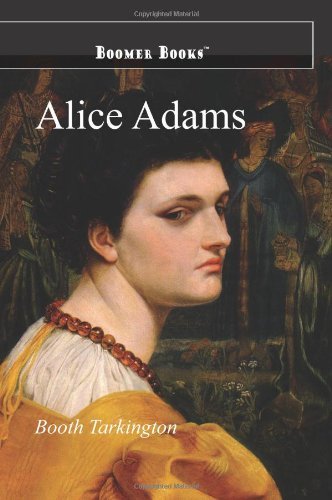Alice Adams
Booth Tarkington
Paperback
(Independently published, Sept. 8, 2019)
Alice brightened a little as she went forward to the front door, and she brightened more when the spring breeze met her there. Then all depression left her as she walked down the short brick path to the sidewalk, looked up and down the street, and saw how bravely the maple shade-trees, in spite of the black powder they breathed, were flinging out their thousands of young green particles overhead.She turned north, treading the new little shadows on the pavement briskly, and, having finished buttoning her gloves, swung down her Malacca stick from under her arm to let it tap a more leisurely accompaniment to her quick, short step. She had to step quickly if she was to get anywhere; for the closeness of her skirt, in spite of its little length, permitted no natural stride; but she was pleased to be impeded, these brevities forming part of her show of fashion.Other pedestrians found them not without charm, though approval may have been lacking here and there, and at the first crossing Alice suffered what she might have accounted an actual injury, had she allowed herself to be so sensitive. An elderly woman in fussy black silk stood there, waiting for a streetcar; she was all of a globular modelling, with a face patterned like a frost-bitten peach; and that the approaching gracefulness was uncongenial she naively made too evident. Her round, wan eyes seemed roused to bitter life as they rose from the curved high heels of the buckled slippers to the tight little skirt, and thence with startled ferocity to the Malacca cane, which plainly appeared to her as a decoration not more astounding than it was insulting.Perceiving that the girl was bowing to her, the globular lady hurriedly made shift to alter her injurious expression. “Good morning, Mrs. Dowling,” Alice said, gravely. Mrs. Dowling returned the salutation with a smile as convincingly benevolent as the ghastly smile upon a Santa Claus face; and then, while Alice passed on, exploded toward her a single compacted breath through tightened lips.The sound was eloquently audible, though Mrs. Dowling remained unaware that in this or any manner whatever she had shed a light upon her thoughts; for it was her lifelong innocent conviction that other people saw her only as she wished to be seen, and heard from her only what she intended to be heard. At home it was always her husband who pulled down the shades of their bedroom window.Alice looked serious for a few moments after the little encounter, then found some consolation in the behaviour of a gentleman of forty or so who was coming toward her. Like Mrs. Dowling, he had begun to show consciousness of Alice's approach while she was yet afar off; but his tokens were of a kind pleasanter to her. He was like Mrs. Dowling again, however, in his conception that Alice would not realize the significance of what he did. He passed his hand over his neck-scarf to see that it lay neatly to his collar, smoothed a lapel of his coat, and adjusted his hat, seeming to be preoccupied the while with problems that kept his eyes to the pavement; then, as he came within a few feet of her, he looked up, as in a surprised recognition almost dramatic, smiled winningly, lifted his hat decisively, and carried it to the full arm's length.- Taken from "Alice Adams" written by Booth Tarkington












